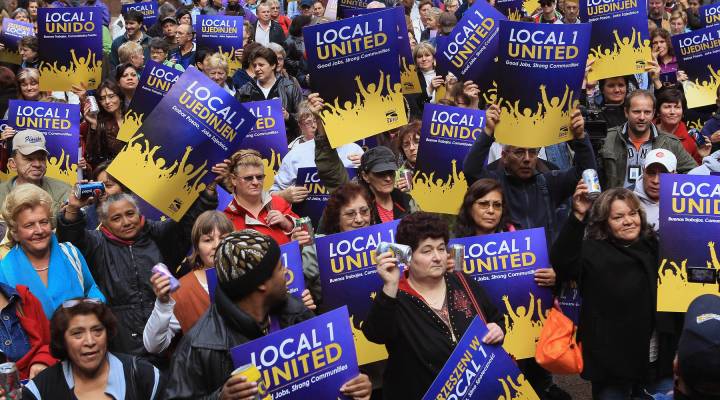
New York union workers threaten strike
Share Now on:
New York union workers threaten strike

Adriene Hill: Now to New York, where negotiations start today between building owners and the union representing the people that clean those buildings. The four year contract will cover 22,000 workers and it’s shaping up to be quite a fight. There hasn’t been a strike in more than a decade but these are different times.
As Marketplace’s Stacey Vanek Smith reports.
Stacey Vanek Smith: Thirty-six-year-old Ivan Alamendarez is sweeping the sidewalk outside the physics building at New York University. He works there as a janitor.
Ivan Alamendarez: We clean the offices, do bathrooms, we scrub, we strip, we wax. Whatever they ask us to do, we gotta do.
Alamendarez has been a member of the Service Employees International Union, or SEIU, for nearly 20 years. He is the sole provider for four children and a wife who has cancer, and says a strike would be financially devastating.
Alamendarez: It means that I’m not going to be able to pay my rent; I’m not going to be able to pay my bills; like I said, my wife, we’ve got bills from the hospital. I don’t even know how we’re going to do it, but I know that it’s the right thing to do to go on strike.
There’s a new determination and anger among union members this year, according to SEIU president Mike Fishman. They are fighting pay and benefit cuts.
Mike Fishman: There’s a sense in this country now — and I think Occupy Wall Street crystallized it — that equal opportunity in this country, there’s a sense that’s being taken away.
Unions of all kinds are gaining momentum, says Michael Hillard, a labor economist with the University of Southern Maine.
Michael Hillard: We could look back on 2011 as the year the labor movement got its mojo back.
Hillard says the public increasingly sees unions as part of the 99 percent, instead of bloated, business-crippling organizations. And that’s giving them the confidence to threaten strikes.
Hillard: What I think is different is this sense that if they go out and strike, there will be a lot of people there to support them.
But Hillard says it’s the worst of times for unions, too. Building owners have already been lining up people out of work to replace the office cleaners.
And there’s not as much money to go around as there used to be, says Howard Rothchild. He’s negotiating the new union contract on behalf of the building owners.
Howard Rothchild: When we sat down four years ago with the union, rents were close to $90 a square foot. Today, rents are close to $47 a square foot — about half of where they were.
And vacancies have doubled. Still, if there’s no resolution by January 1st, workers say they’ll strike.
In New York, I’m Stacey Vanek Smith for Marketplace.
There’s a lot happening in the world. Through it all, Marketplace is here for you.
You rely on Marketplace to break down the world’s events and tell you how it affects you in a fact-based, approachable way. We rely on your financial support to keep making that possible.
Your donation today powers the independent journalism that you rely on. For just $5/month, you can help sustain Marketplace so we can keep reporting on the things that matter to you.


















